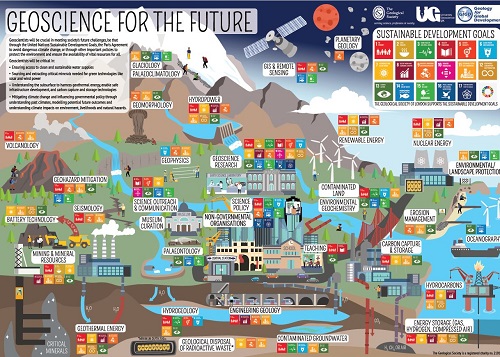Day, S., That's a wrap! Geoscientist
30 (2), 5, 2020
https://doi.org/doi: 10.1144/geosci2020-068,
Download the pdf here
 If you’re reading this on paper, you’ll hopefully already have noticed the good news – the plastic wrap is history. From now on, Geoscientist will be mailed to readers in biodegradable wrap, as part of a wider Society move that includes the flagship Journal of the Geological Society and a growing list of other publications.
If you’re reading this on paper, you’ll hopefully already have noticed the good news – the plastic wrap is history. From now on, Geoscientist will be mailed to readers in biodegradable wrap, as part of a wider Society move that includes the flagship Journal of the Geological Society and a growing list of other publications.
It’s clear how important this is to readers from the response to our October special issue on plastics – thank you to everyone who wrote in. Our new BIOPLAST 300 wrap, based on potato starch, is 100% home compostable and leaves behind no microparticles at the end of its life.
A big step forward for Geoscientist magazine might feel like a drop in the ocean when compared to the larger challenges of climate change, but there’s truth to the adage that every little helps. It’s easy to get overwhelmed – in researching this editorial, I learned the term ‘eco anxiety’ – more and more of us are feeling panicked by what we’re seeing in the news, in scientific papers or in reports from experts.
It’s easy, too to tip from panic into hopelessness. Hopelessness is not, as panic can be, a motivating feeling. It doesn’t provoke us to action, but paralyses us on the spot. What we need, to avoid feeling powerless, is something to do.
There’s plenty to do, of course, and most of us are working on some combination of recycling, trying to fly and drive less, use less plastic. Geoscientists are well placed to help in ways beyond the individual – for example, this months’ feature discusses the potential of ground source heat technology in reducing emissions from UK heating systems. In their discussion of the current state of play, David Banks and David Birks take an optimistic, yet practical approach. There’s work to be done, but the rewards are clear - it’s an industry which has the potential to change our energy consumption in a meaningful way, and geoscience expertise is a large part of that. There are real, practical things we can do to make a difference.
Recently, the Society’s education team released ‘Geoscience for the future’, a poster (see below) outlining the many ways in which geoscience can help meet the UN sustainable development goals - seventeen goals which will help us achieve a better world for everyone. It serves as a useful reminder of how wide ranging our subject is, and might also help combat that familiar concern that we need to do more to communicate the real world relevance of our subject to prospective students. The poster has been shared hundreds of times online, and displayed in schools and offices around the country.
It seems to me that part of the reason for the popularity of resources like this are their realism – rather than lofty sentiments or expansive claims, they pin geoscientists’ expertise directly to each goal, giving us a tangible way to see how we might make a change.
They’re also representative of the world as it is – the oil and gas industry, renewable energy, academia and industry are all there, all showing how the expertise gained by a career in geoscience can and already has made a difference. It’s a great way to directly correlate the relevance of our science to wider global issues.
So if you’re feeling powerless at the state of the world, I recommend visiting www.geolsoc.org.uk/posters and downloading a copy. Not only are there things everyone can do – you might find you’re doing more of them than you thought.
SARAH DAY, EDITOR
[email protected]
@geowriter
@geoscientistmag